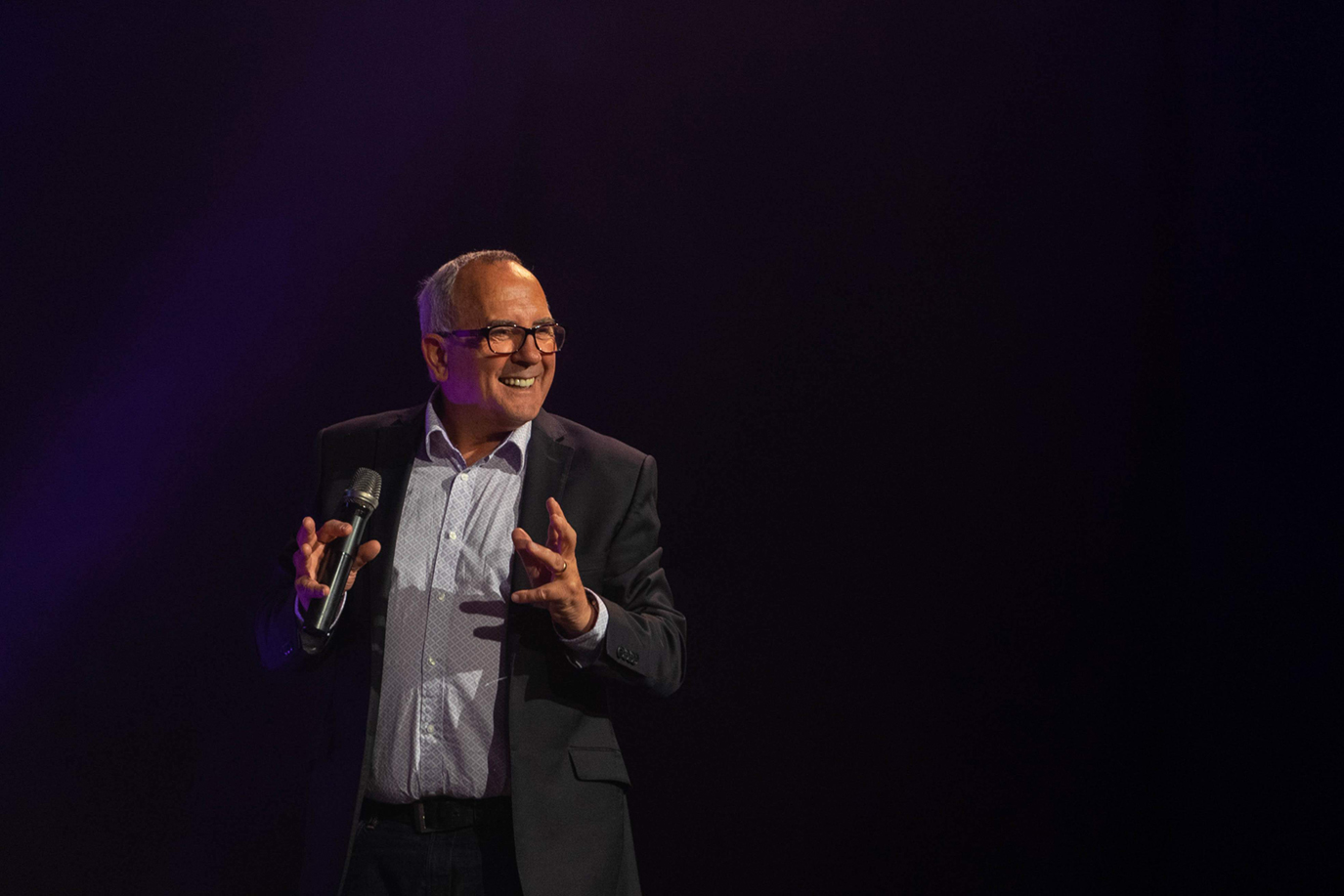How does a visionary leader live a life of legacy?
We had the privilege of having Pastor Bruce Monk share on the 100X Legacy Business Podcast. He started his journey as a dairy farmer in Otaki, New Zealand, and today leads the Equippers Network, which has 50 churches across 20 countries,
In his early twenties, Bruce purchased his own farm, with the help of his father. At this time, Bruce and his wife Helen also made a strong commitment to Christ and started going to a small rural church.
One week, the pastor didn’t have anyone to preach, so Bruce was given the opportunity to.
This was the beginning of Bruce thinking, ‘Perhaps I’m called to do this!’.
His heart began to shift, and farming, which he was doing for the money, lost its edge.
He then went into ministry and served as a Pastor in Gisborne, Whanganui and Lower Hutt in New Zealand. In 1986, Bruce and his family moved to Auckland to pastor a church of 30 people: 6 of whom were retired pastors. Bruce said it was “a nightmare!”.
Bruce sat down with Pete and the 100X Legacy community to share 3 leadership lessons he has learnt on the way:
1. EMBRACE THE AMBIGUITY
Bruce describes himself as a very logical person. He likes things to be clear. “I like to know where I am going. I like to know every step and the details with it.”
However, throughout life’s journey, Bruce has discovered that God does not always give us the answers in detail. Reflecting on the past, Bruce says this “frustrated the hell out of me”. But it became a gift that enabled him to take hold of what God wanted – experiencing His supernatural ability coming into his life and work. This led him into areas he could have never navigated himself!
Bruce encourages us not to nail things down, but to live with ambiguity: to allow God into them. This is where he has seen supernatural scenarios and God opening doors he’d never foreseen entering.
For example, In 1995, Bruce had a clear direction; a goal to plant 10 churches in 10 major cities of the world. He was led to the right contacts in cities such as Rome and Budapest, where Equippers Churches would soon be planted.
Bruce encourages us to know where we want to go, but to live with the assurance that God has our lives in his hands. He says that’s where the thrill and excitement of walking this path with the Holy Spirit comes in.
With vision, Bruce explains you must look forward and take the next step.
A step of faith that Bruce took was handing over the church in Auckland to his son and moving to London, 20 years ago.
He didn’t know how this was going to work, as Sam was only 26 at the time. There were lots of steps of faith to it but Bruce knew he was the right person for the job.

2. FAITH SEES AND WISDOM BUILDS
Vision alone won’t get us there and neither will structure. Both of these components need to work together to move us forward.
Bruce gives a helpful illustration of a rubber band:
“If you had a rubber band around two fingers. Vision is my right finger. The left is actual reality (where I am now).
Most visionary people go so far that they snap the rubber band… and they wonder why they’re not getting to where they want to be.
Then you have the realists, who have no vision but they might have a lot of structure in place. Without any vision, they just stand still. They don’t go anywhere.
Imagine a caterpillar. Vision goes forward enough to pull reality along the way. It goes out a little further and then pulls reality along the way.

Vision is always pulling, but reality has got to know wisdom… A caterpillar just keeps moving forward.
Sometimes that can happen quickly… other times, you’ve got to just say ‘No, I’ve got enough stretch here that it’s not going to break me, but it has got enough reality to catch up’.”
Vision is important. You have to know where you’re going.
Wisdom is the ability to take what you see, and understand the steps needed to carry that vision forward.
Vision is seeing the future. Wisdom then helps you form the culture and develop the values: the vehicle upon which you’re going to carry it.
Bruce explained how:
Visionaries are needed to keep moving forward. (Otherwise, things stagnate)
AND
Good structure is needed, (Otherwise, it’s out of control)
Bruce has a good team of managers around him who see things he doesn’t and helps “put the rubber on the road”. They give traction. They don’t pull the handbrake but share in the faith and the vision he sees.
“Such a team develops over time, when they see your vision is not going to break them… you’re just going out there enough”.
Some leaders go so far out that the people in their team don’t trust them, as they’re not fulfilling the vision.
Bruce encourages us to just go far enough out so they say ‘Okay, I can hear you. I can see there is a faith challenge in this, and I’m prepared to go on the journey’.
If it works, they’ll trust you the next time and you can go a little bit further. Initially, you may have to develop some of that by yourself, but ultimately, it’s that team dynamic that is paramount.
Bruce said he has been blessed with five strategic people who have helped him to put things into place; “I could see it, but they actually ‘baked the cake’.”
Bruce shared an analogy from The Bible of a church being like a body. It’s not just one person. One man or woman can do something, but to achieve what you really see – you need to know how to work and cooperate with other people. You have to inspire them. This is how you take vision and move reality forward.
![]()

3. PRESSURE STRENGTHENS AND CLARIFIES WHAT IS IMPORTANT
None of us like pressure!
Bruce explained how we think the pressure is working against us but one of the things he has learnt is that pressure is his servant.
“With COVID, I told our network, ‘COVID is our servant. It’s not our master’. We’re going to make it serve us. We’re going to get the best out of it. We’re going to grow through it.”
Life allows pressure to form us. Physically, you cannot develop muscle without pressure. We too, cannot develop what we see and what God has called us to do, without pressure. Don’t run away from pressure, learn from it.
One thing Bruce said pressure does for him is to simplify things.
“A lot of leaders are too cluttered – there is too much noise around them and they can’t stay focused. For me, pressure always brings me to a point to go; ‘Okay, what do I need to get rid of? Where’s the noise? Where are the distractions?’.”
Let pressure serve, strengthen and also simplify things around you. It’s easy to get distracted from what we’re called to do and lose the cutting edge.
Bruce talked about how, when shaving, you have to have a pretty good razor blade to get the whiskers off.
“But one thing my father taught me is, you can have an axe as sharp as a razor blade, but you’ll never cut a tree down with a razor blade!”
Bruce observes that a lot of people are as sharp as a razor blade, but they don’t have the weight behind them.
![]()
![]() God builds weight into our lives over a period of time… but we need to keep ourselves sharp, because a blunt axe is no good.
God builds weight into our lives over a period of time… but we need to keep ourselves sharp, because a blunt axe is no good.
Things like how much weight we have behind us and how much of an impact are hard to measure but Bruce encourages us by saying “We can count the seeds in an orange, but only God knows how many oranges are in a seed!”
Bruce hopes he can mobilize enough leaders who are like seeds. He wonders how many lives can be touched by that one seed being planted in the right place.
“When I now think of churches around the world, I don’t think so much of the numerical size of the church – I think of the influence of those men and women who were prepared to plant themselves in that soil. Coming back to my analogy, I wonder how many oranges are in those people’s lives. This is my hope!”
Bruce steers us away from the ‘Lotto Mentality’.
“Only 1%, if that, have the potential to be a superstar or win the lottery. It wouldn’t even be 1%. But isn’t it sad that most of society have been sold that dream?
Whereas I’m actually the 99% and I’ve got to learn the rhythms that bring growth in life and multiplication; that is seed-time and harvest. It’s about sowing seed, developing, processing and growing stuff.
Destroy the lotto mentality.
I am the 99%. It hasn’t happened quickly, but it has happened because I just have stayed true to what I’ve been given to do.”
Solid.
Faithful.
Loyal.
Consistent.
‘I’ll be here tomorrow.’
“Come on, get out there, and sow some seeds! Develop and put some things in place!”
When asked what keeps him going through the tough times, Bruce had an experiment once where he:
- Read 1 King 4:29, and believed the Holy Spirit spoke to him “Bruce, your heart is too small for what I want you to do”.
- Saw too, in Psalm 78:41, it is written that the children of Israel limited God
- Had a dream where He heard God say at the end of his life; “You loved me, but limited me in your life.”
This still motivates Bruce today and he shared how he never would have left NZ and gone to London without this.
“I know I’m called to empower another generation to mobilise and coach people.
Our group of churches is called ‘Equippers Church’.
It came out of revelation, simply because God has called me to be an equipper of people and to mobilise them so that they can become all that God has called them to be.”
When asked what is one next step he’d encourage us to take, Bruce replied:
“Life is about rhythm. Sometimes we compartmentalise our lives. I think that’s dangerous. Life for me is like a wheel… I have Jesus in the centre of it.
I believe one day I’ll have to stand before God and have to give an account for my marriage, my children, my grandchildren and what I’m called to do.
I also think that I have to give an account for how I enjoyed life, because otherwise how am I going to inspire people if I’m just a boring, old, fart that’s locked in and never really gets out and has any activity.”
He challenges us with the question: what is your life like?
Is it consumed with one thing or is it holistic?
Thank you Bruce for an inspiring and motivating session! There is so much wealth and wisdom in the years and journey you have walked.
If you would like to hear more. Bruce has a book titled; ‘Pave The Way: Embracing a life of legacy’. In this book, Bruce encourages us that significance is found in carving a path for another generation to follow.

